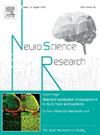睡眠与抑郁的双向关系
IF 2.4
4区 医学
Q3 NEUROSCIENCES
引用次数: 0
摘要
抑郁症患者几乎不可避免地表现出睡眠异常,例如进入快速眼动(REM)睡眠的潜伏期缩短,非快速眼动睡眠期间脑电图δ波功率下降。睡眠不足会带来压力,而压力的积累会导致心理健康恶化,并导致精神疾病的发展。因此,抑郁症和睡眠很可能是双向相关的,即抑郁症的发展会导致睡眠障碍,反之亦然。然而,抑郁和睡眠之间的关系似乎很复杂。例如,严重的睡眠剥夺可以矛盾地改善抑郁症状。因此,很难断定睡眠对抑郁症患者是有益的还是有害的。抗抑郁药如何影响抑郁症患者的睡眠可能为理解睡眠的影响提供线索,但考虑到抗抑郁药除了睡眠还有其他多种影响,需要谨慎。最近的动物研究支持抑郁和睡眠之间的双向关系,并且抑郁症的动物模型有望有助于识别连接压力、睡眠和抑郁的神经回路。这篇综述提供了关于抑郁和睡眠之间关系的当前知识的全面概述。本文章由计算机程序翻译,如有差异,请以英文原文为准。
Bidirectional relationship between sleep and depression
Patients with depression almost inevitably exhibit abnormalities in sleep, such as shortened latency to enter rapid eye movement (REM) sleep and decrease in electroencephalogram delta power during non-REM sleep. Insufficient sleep can be stressful, and the accumulation of stress leads to the deterioration of mental health and contributes to the development of psychiatric disorders. Thus, it is likely that depression and sleep are bidirectionally related, i.e. development of depression contributes to sleep disturbances and vice versa. However, the relation between depression and sleep seems complicated. For example, acute sleep deprivation can paradoxically improve depressive symptoms. Thus, it is difficult to conclude whether sleep has beneficial or harmful effects in patients with depression. How antidepressants affect sleep in patients with depression might provide clues to understanding the effects of sleep, but caution is required considering that antidepressants have diverse effects other than sleep. Recent animal studies support the bidirectional relation between depression and sleep, and animal models of depression are expected to be beneficial for the identification of neuronal circuits that connect stress, sleep, and depression. This review provides a comprehensive overview regarding the current knowledge of the relationship between depression and sleep.
求助全文
通过发布文献求助,成功后即可免费获取论文全文。
去求助
来源期刊

Neuroscience Research
医学-神经科学
CiteScore
5.60
自引率
3.40%
发文量
136
审稿时长
28 days
期刊介绍:
The international journal publishing original full-length research articles, short communications, technical notes, and reviews on all aspects of neuroscience
Neuroscience Research is an international journal for high quality articles in all branches of neuroscience, from the molecular to the behavioral levels. The journal is published in collaboration with the Japan Neuroscience Society and is open to all contributors in the world.
 求助内容:
求助内容: 应助结果提醒方式:
应助结果提醒方式:


